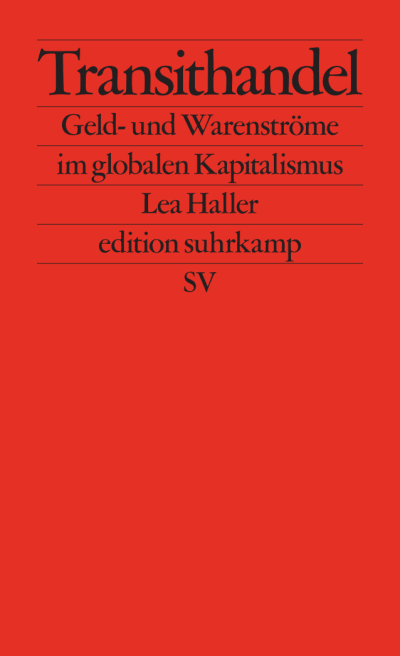Coffee, cotton, rubber – there are hardly any goods that are not shipped across the oceans. This global trade is not driven only by producers and consumers, but by middlemen. Lea Haller presents a history of merchanting trade transactions that make up an enormous part of the global economy.
Focusing on Switzerland, whose trading companies control one fifth of worldwide commodity trade today, Haller shows how political institutions, trading technologies and financial instruments...
Coffee, cotton, rubber – there are hardly any goods that are not shipped across the oceans. This global trade is not driven only by producers and consumers, but by middlemen. Lea Haller presents a history of merchanting trade transactions that make up an enormous part of the global economy.
Focusing on Switzerland, whose trading companies control one fifth of worldwide commodity trade today, Haller shows how political institutions, trading technologies and financial instruments changed over time and shaped the process of global integration. The result is nothing less than a history of the emergence of the world market.
»Lea Haller’s ground-breaking study sheds light on the key players that have shaped the global flow of commodities from 1850 up through today.« Adam Tooze
»A brave book.« Alexis Schwarzenbach, Neue Zürcher Zeitung
»Lea Haller has written a convincing book. Since intermediary trade has hardly received any recogniction in economic history so far, it fills an academic void.« Friedmann Bieber, Frankfurter Allgemeine Zeitung
»In great detail [Haller] retraces how Switzerland started to become a ›global hub‹ in the middle of the 19th century. […] Moreover, she examines the changes within global trade in the course of technological developments and political crises. And she tells the story of a capitalist economy in which buyers and sellers don’t find each other miraculously in the neutral space of a self-regulating market but that it is through mediation that they emerge in the first place.« Thomas Speckmann, Der Tagesspiegel
»Intermediary Trade is a smoother read than many other titles on economic history – a field in which it is especially hard to tell stories in a sophisticated manner. The book is filled with theoretical insights without boasting about presenting a comprehensive theory of global capitalism.« Jürgen Osterhammel, Neue Zürcher Zeitung
»She masters the challenge of portraying an extensive image of the phenomenon in its brief existence brilliantly.« Andreas Exenberger, Historische Zeitschrift
»Haller’s book is well-researched and rich in detail.« Deutschlandfunk
»The historian points out correlations, illustrates market mechanisms like hedging or clearing clearly without concealing dark sides such as [Switzerland’s] connections to the Nazi regime.« sonntagszeitung.ch
»Lea Haller’s ground-breaking study sheds light on the key players that have shaped the global flow of commodities from 1850 up through today.« Adam Tooze
»A brave book.« Alexis Schwarzenbach, Neue Zürcher Zeitung
»Lea Haller has written a convincing book. Since intermediary trade has hardly received any recogniction in economic history so far, it fills an academic void.« Friedmann Bieber, Frankfurter Allgemeine Zeitung
»In great...
Persons
Lea Haller
Lea Haller, born in 1977, holds a PhD in history from ETH Zurich. She has worked at SciencesPo in Paris, at Harvard University and the University of Geneva. She is now editor-in-chief of the monthly history magazine NZZ Geschichte published by the Neue Zürcher Zeitung.
Lea Haller, born in 1977, holds a PhD in history from ETH Zurich. She has worked at SciencesPo in Paris, at Harvard University and the University...
